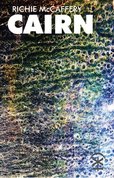reviewed by Judi Sutherland
A Place Where the Dead are Anything But
This is one theory: that the people who become poets are those who are living the ‘examined life’ as Socrates exhorted us to do. Poets notice things; they store them up, ruminate on them, invest them with meaning, and then, out they come as poetry, transformed but recognisable. At the outset of their careers, the part of life that poets often examine is their own identity. Where are they from? Who were their forebears? How do they fit in to their own story? ‘Cairn’ is Richie McCaffery’s first collection. Throughout the book, his past, and his family’s past, are his major concerns.
wondering about the frailty not only of human life but of our identity.
Here’s another thing; early in a poet’s career, he or she will receive advice about how to turn ruminations into good poetry. Be specific rather than general. Show, don’t tell. Sooner or later in a workshop, they will be asked to bring to mind a significant object, weigh it in their hands, consider how it was made. If this object were able to speak, what would it say to you? If it could dream, what would it dream of?
McCaffery’s collection draws on both these impulses. He selects a number of objects that are significant to him, and makes them stand for something or someone; a Parker 51 pen; his grandfather’s police whistle; a leatherette phone book; a silver spoon; a wallet. The poet has to tread carefully; there is danger here, danger that the relationship between each object and its signifier is too glib, nothing but a vehicle for nostalgia. Another poet I know refers to “Grandmother’s Handbag poems” in which the powder compact and the bag of mint imperials Granny always carried convey nothing much but the feeling that time has passed – a reminiscence project for the children we once were. To be successful, these poems based on other people’s belongings have to reach beyond the object, beyond the memory, towards the universal truth. How well does McCaffery achieve this?
One happy discovery is that he has a talent for unusual imagery. In the first poem, ‘Dedication’, he gives us ‘Bullets hitting the water / like kingfishers’. The chrysalis of a butterfly is ‘a shrivelled pod of staircase wit’. He tells us, truthfully or not: ‘There is as much ash / in a smoked tab as there is / in a cremated finger’. This keeps the little museum fresh. There are indeed some cases where the treasured object leads us beyond the poet’s identity to something we can all understand. ‘The Truth So Far’ is concerned with a teacher writing on a blackboard; ‘the truths about God and arithmetic / with the expungeable white of fossil shells’. This image seems to take us into an analysis of permanence and impermanence, the arbitrary nature of education, the randomness of memory.
McCaffery is skilful with his semiotics in many of the objects he holds up for examination. A baby’s first tooth holds all of human evolution: ‘Ivories / appearing from the unknown, Theo / cutting his teeth on the bones in a cave.’ (‘Ivories’). ‘Viv’ is his grandmother’s friend who was run over: ‘a little gabardine matador’ in the middle of the road. A policeman’s clip-on tie is contrasted with a properly Windsor-knotted one as a metaphor for relationships between fathers and sons. These reflective moments are what raise McCaffery’s collection beyond nostalgia into the realms of philosophy. In many ways I wish a young poet were more concerned with today’s world rather than the past, but this is McCaffery grounding himself in family and culture. It could have been a self-indulgent set of poems but it’s not, there is much here to set up reverberations in the reader’s memory.
Also, in calling up his family tree there are some stories which are not universal. McCaffery’s mother appears to have been, very literally, a foundling. In ‘Arrival’ he tells us:
When my mother arrived no one would sign for her, left out like a parcel on a stranger’s doorstep.
We are shocked to know that this baby had ‘tiny lungs like strawberries / full of pneumonia’.
In ‘Spinning Plates’ the poet’s mother’s experience of miscarriage has evolved her own take on the chance nature of life:
She said being pregnant was like spinning a bone-china plate on the thinnest stick inside you - breakages were bound to occur. It was a question of which piece could drop intact and roll around on a hardwood floor, its rim ringing with cries
Observations like these help us to wonder about the frailty not only of human life but of our identity. If that foundling baby had not lived and had a child of her own, then McCaffery would not have existed. There’s so much in this collection that reflects on that thought. Like him, we can all consider the chance moments of good fortune that brought us to be this person in this place. Who we are is ultimately the story of who, and what, survives.
Judi Sutherland gained a PhD in Biochemistry before embarking on a career in pharma / biotech and started writing poems in 2008. After redundancy in 2011, she obtained an MA in Creative Writing from Royal Holloway, University of London, and is now writing a novel, as well as poetry, blogs and reviews. Her poems have been published in Acumen, Interpreter’s House, Oxford Poetry and New Statesman, among others. Her writing blog can be found at www.judisutherland.com and her Huffington Post articles are right this way.









